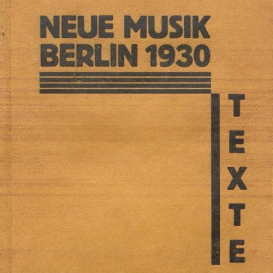When radio made it possible to transmit sounds across chronological and spatial distance, new listening situations and new approaches to the interaction with music arose, and never-before-heard sounds were generated in the experiments of the Rundfunkversuchsstelle radio lab in Berlin. Weimar Germany’s state-organized radio broadcasting was the agency responsible for this radio music culture. My project differs from existing research in rejecting the notion of a radio-specific music of the 1920s and 1930s and a body of validated knowledge on the arrangement of music, radio, and the listener. Instead, radiophonic music of the period was concerned with an experience-based experimental culture in which traditional media practices and aesthetic models were superimposed with new, radio-specific approaches. Focusing on texts and compositions by Bertolt Brecht, Rudolf Arnheim, Walter Benjamin, Max Butting, Kurt Weill, Paul Hindemith, Walter Gronostay, and others, I show how three interfaces between music, radiophonic arrangement, and discourse came to the fore: music as sound/sound as music; the aesthetic reflection of radio’s global dimension; and the search for a musical form corresponding to the technical character of radio. I study these three levels through the prism of their technical, discursive, and musical aspects.

Caption Text: The Festival Neue Musik 1930 included composing for radio.
Source: Neue Musik Berlin 1930. Berlin: Ottens, 1930.
Project
(2019-2020)
